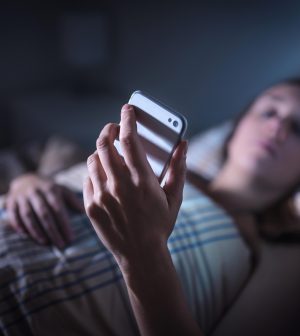- Could Your Grocery Store Meat Be Causing Recurring UTIs?
- Are You Making This Expensive Thermostat Error This Winter?
- Recognizing the Signs of Hypothyroidism
- 10 Strategies to Overcome Insomnia
- Could Artificial Sweeteners Be Aging the Brain Faster?
- Techniques for Soothing Your Nervous System
- Does the Water in Your House Smell Funny? Here’s Why
- Can a Daily Dose of Apple Cider Vinegar Actually Aid Weight Loss?
- 6 Health Beverages That Can Actually Spike Your Blood Sugar
- Treatment Options for Social Anxiety Disorder
Texting, Video Gaming Especially Bad for Teen’s Sleep: Study

Any type of time spent looking at screens before bed is bad for kids’ sleep, but new research shows that “interactive” screen time — texting and video games, for example — is especially harmful.
The effects of interactive screen time on sleep might not even be restricted to bedtime — researchers found the total time per day spent texting/gaming mattered, too.
For each hour during the day that teens played video games beyond their usual amount, sleep that evening was delayed by 10 minutes, said a team from Pennsylvania State University.
In the study, the Penn State researchers used surveys to track the daytime “screen activities” of 475 adolescents. Included in those activities was email, texting, instant messaging or messaging via social media. Also included were video gaming (an interactive activity), plus more “passive” pursuits such as surfing the internet or watching TV or online videos.
The researchers also had the kids wear wristband accelerometers, which measured their body movements throughout the day. Periods of little movement typically mean the person is asleep.
That method is “more accurate than asking them how many hours they slept,” study lead author David Reichenberger explained in a university news release.
The study found teens spend a lot of time communicating with friends: About two hours a day emailing, texting, instant messaging, on average.
They also spent, on average, about 1.3 hours per day playing video games, and 1.7 hours per day passively watching TV or videos.
In terms of the hour before bedtime, 77% of the adolescents were involved with “interactive” media (texting, video games and the like) while 69% watched TV or movies, according to the researchers.
Kids got an average 7.8 hours of sleep per night, the study found.
Interactive screen time appeared to be more detrimental to slumber than passive watching, Reichenberger’s group found.
For each hour they texted, messaged or gamed during the day, adolescents fell asleep about 11 minutes later. If these interactive activities occurred in the hour before bed, they got to sleep 30 minutes later, on average.
However, more passive watching of TV or online videos appeared to have little impact on the timing of kids’ sleep.
“It could be that these more passive activities are less mentally stimulating than interactive activities, like texting and video game playing,” said study co-author Anne-Marie Chang, an associate professor of biobehavioral health at Penn State.
The findings were published Dec. 13 in The Journal of Adolescent Health.
Reichenberger, a Penn State postdoctoral scholar, said hours spent on interactive media could become problematic for kids’ sleep and overall health.
“If teens typically play video games for an hour each day, but one day a new game comes out and they play for four hours, that’s three additional hours more than they typically play,” Reichenberger explained. “So, that means they could have 15 minutes of delayed sleep timing that night. For a child, losing 15 minutes of sleep at night is significant. It’s especially difficult when they have to get up in the morning for school; if they’re delaying their sleep, they can’t make up for it in the morning. Without adequate sleep, kids are at increased risk of obesity, as well as impaired cognition, emotion regulation and mental health.”
Is there much parents can do?
“It’s a tricky situation,” Chang said. “These tools are really important to everyone nowadays, so it’s hard to put a limit on them, but if you’re really looking out for an adolescent’s health and well-being, then you might consider limiting the more interactive activities, especially in the hour before bed.”
More information
Find out more about media & kids’ sleep at the American Academy of Pediatrics.
SOURCE: Pennsylvania State University, news release, Dec. 13, 2023
Source: HealthDay
Copyright © 2026 HealthDay. All rights reserved.










